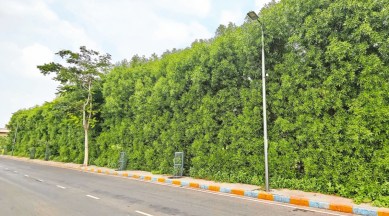Stay updated with the latest - Click here to follow us on Instagram
Gujarat turns over new leaf, bans invasive tree species: ‘Adverse impact’
Earlier, Telangana had also banned the plant species, which is widely used in public spaces for its ornamental looks but is known to have adverse effects on the local biodiversity.

FROM THE Sabarmati riverfront in Ahmedabad to the Ram Van “urban forest” in Rajkot, rows of Conocarpus trees, an exotic mangrove species, have been planted by the local administration in Gujarat over the last few years. But, the state government has now banned its “plantation in forest or non-forest area”, underlining its “adverse impacts on environment and human health”.
Earlier, Telangana had also banned the plant species, which is widely used in public spaces for its ornamental looks but is known to have adverse effects on the local biodiversity.
“Research reports have highlighted adverse impacts/ disadvantages of this species on environment and human health… Trees of this species flower in winter and spread pollen in nearby areas. It is learnt that this is causing diseases like cold, cough, asthma, allergy etc,” Chaturvedi said in the circular .
Conocarpus is an evergreen species with dark-green shiny leaves. It is a fast-growing species which is reported to be not palatable to wild herbivores or domesticated animals.
“Roots of this species go deep inside the soil and develop extensively, damaging telecommunication lines, drainage lines and freshwater systems,” he said. “Keeping the above facts in mind, nursing of any Conocarpus plant in the departmental plant nurseries and Van Mahotsav nurseries, as well as their plantation in forest area or non-forest area is hereby prohibited,” he said.
The forest department has also been directed to raise public awareness about its “adverse impacts” through events like “farmer workshops, nature education camps”.
From beautification of public spaces to residential societies and factories, Conocarpus trees have been the popular choice in recent years, and are a common sight across Gujarat’s cities. They are being grown as trees lining public roads as well as hedges along walkways in gardens and are amenable to be trimmed into various shapes.
In Rajkot, it is the most visible species in Ram Van, an urban forest developed by the Rajkot Municipal Corporation (RMC) at a cost of Rs 13.77 crore. According to officials, of the total 80,000 saplings planted in the area, about 7,000 were Conocarpus.
“We planted Conocarpus on the boundary of the park to create a hedge. We also planted it as a decorative hedge lining the walkways,” said Laxmansinh Chauhan, RMC’s director in charge of parks and gardens. “The land on which Ram Van has been developed is rocky and native species like the Gum Arabic tree and Jujube don’t grow easily. Therefore, we were advised to plant Conocarpus,” he said.
In Vadodara, the municipal corporation has planted about 25,000 Conocarpus saplings. “For over two months, we have started pruning them to restrict their growth… They have been shortened to about five feet, as uprooting them completely is a challenge,” said Mangesh Jaiswal, director of parks and gardens, Vadodara Municipal Corporation.
In Ahmedabad, Conocarpus saplings were first planted along the Sabarmati riverfront in 2016-17. The species is now seen in many other areas of the city, including along a wall near the airport that hides a slum area.
“We have stopped new plantation and will prune the existing plants. But we are not uprooting these for now,” said Jignesh Patel, director in charge of parks and gardens, Ahmedabad Municipal Corporation.
Asked about the high water absorption by the species, Patel said pruning the plants would control the water requirement too. “Most of the private premises prefer Conocarpus because of its fast growth, density and appearance. Most of the party venues in and around the city have used this as a wall,” he said.
Meanwhile, welcoming the forest department’s decision, Professor Padamnabhi Nagar, an associate professor with the botany department of M S University of Baroda, said Conocarpus has no role in the local ecosystem. “Our wildlife will not respond to Conocarpus as it is not a native species,” said Nagar, adding that there are many native plant species which are viable options.
Some forest officers said the species may not be harmful if planted in certain areas “Conocarpus is a hardy mangrove species which grows easily, from inter-tidal zones to deserts to urban landscapes. It stores a lot of carbon. It does suck in a lot of soil moisture, but that is true for all fast-growing species… As it is an exotic species, wildlife may not find it useful. However, it may not be a bad idea to plant Conocarpus in waterlogged areas,” said a forest officer.
– With inputs from Aditi Raja in Vadodara, Ritu Sharma in Ahmedabad